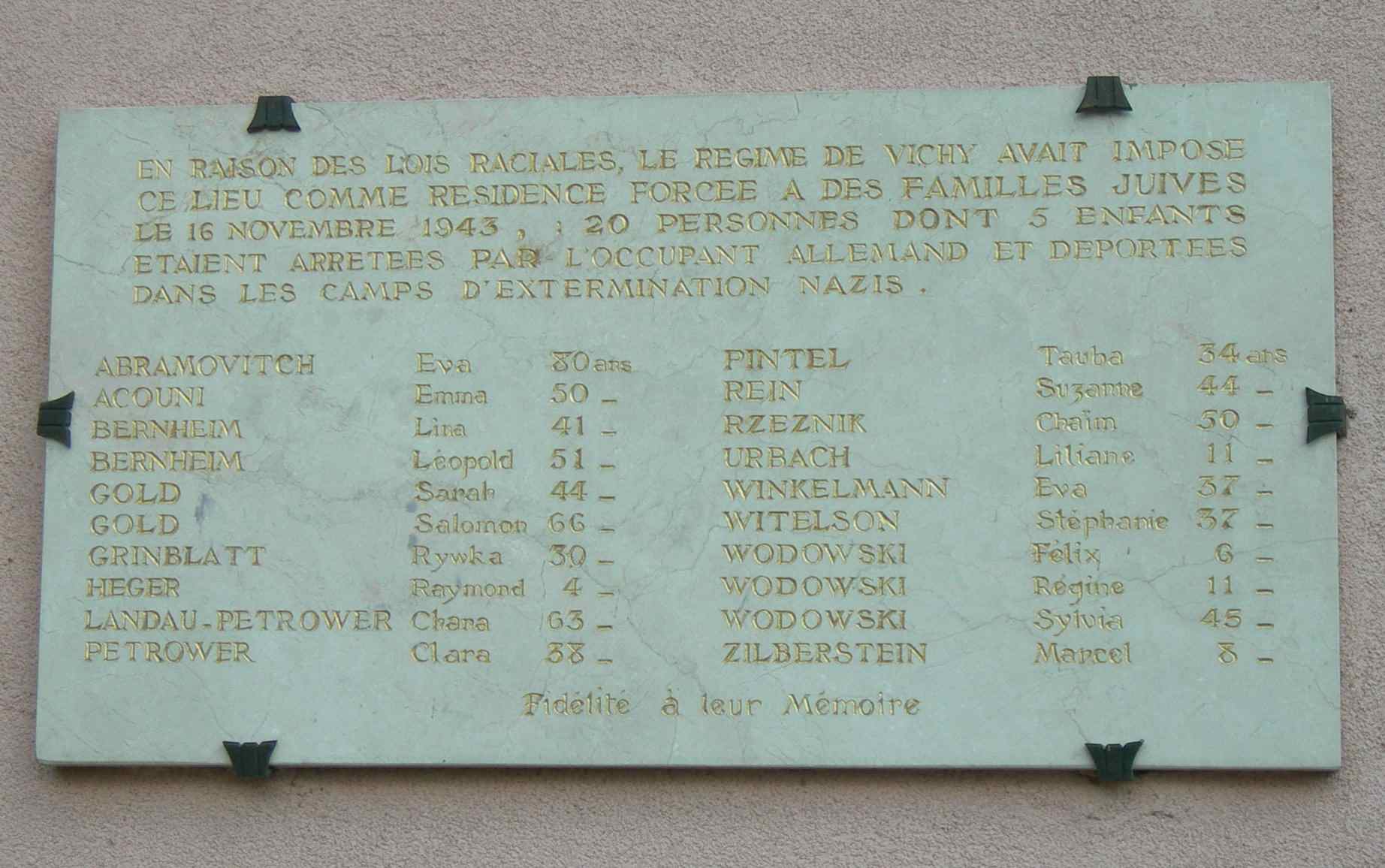-
A little boy was playing outside his house in an area of the town of Annecy (France) called ‘Les Marquisats'. He called up to his mother at the window just as officers of the Vichy government were doing a round-up of the Jews in the area. His mother was one of them but, when asked, denied that the little boy was in fact her son. That was the last the boy saw of his family. They were held locally for a short period and then sent to their deaths in a German concentration camp. On the front wall of the building in which they were initially confined - now the very pleasant ‘Hotel des Marquisats' - is a plaque, put up in memory of the deportees, at the instance of the man who was the little boy. 
Each year there is small ceremony to mark the event and on the 60th anniversary, there was a gathering of dignitaries including the Prefect of the Haute Savoie , the chief Rabbi and the deputy chief Rabbi for the area. I remarked to the hotel owner that this was a good thing to do. To my surprise, he demurred saying, "Yes, but what about the effect on the present generation of Germans? They are made to feel bad because of their past by such events and the French are encouraged to think badly of them as well". A fair point.
We, too, have local and national remembrance ceremonies at which dignitaries take part and where we as a nation remember the victims of the last two wars at the 11th hour of the 11th day of the 11th month - regardless of our personal involvement in the wars or whether our immediate friends and family were substantially affected by them, as that little boy's were. Such ceremonies are arguably a part of a sort of pact between the living and the dead, but perhaps we should ask ourselves how much such events give us ‘permission' to think in bigoted terms about other nations and encourage a mentality in which it is proper to blame the children for the sins of their fathers - not overtly, perhaps, but by implying that the children conform to the same stereotype as that attributed to their parents during the period of conflict
There is no doubt that such stereotypes are encouraged in time of war between countries. We are asked to think of a whole nation as being our enemy, and as living by different and lower standards than us. In war, propaganda replaces truth. There is no distinction between those of the enemy who may really be against us and those who disagree with what is going on and just want to get on with living their lives. Such an attitude towards the enemy unites us in common cause against them and so helps the ‘war effort'. At the end of any war, however, the hatred and distrust so engendered lives on - on both sides - and we become set in our belief that the behaviour attributed to the ‘enemy' is in fact their national characteristic. An idea the red tops are only too happy to play on to sell newspapers.
Unfortunately it is not only in time of outright war that this happens. It is happening now. Certain sections of the Muslim community are encouraged to see Jew and Western 'infidel' alike as their enemy and the enemy of their religion. This is based in part upon Israeli ‘occupation' of Palestine and underlined both by the West's activities in Iraq and what is perceived as the West's decadence as judged by their religious values. Likewise, terrorist attacks by some such people encourage us to think that anyone who is a Muslim shares the beliefs of the people perpetrating them and so we are suspicious of them all.
That we have people who will try to build peace upon such unpromising foundations is encouraging and vital in dampening down the fires of violence. It seems to me, however, that we should all try to set an example both by refusing to accept such use of national or religious stereotyping and by making a real effort to bring to an end the re-living of our old conflicts.
In that context we ought to continue down the path of making remembrance ceremonies non-specific as regards particular wars and particular enemies. If not, we are part of the same mentality as that which seems to exist in the Middle East with its memories of wrongs going back not 60 years, but thousands of years - and with the corresponding urge to wreak vengeance. As my cousin pointed out at the same time, the Jews themselves remember their escape from enslavement to the Egyptians in their passover ceremony each year - and their exodus from Egypt must have been at least 3,000 years ago! No, national memories of terrible events should be allowed to slide away fairly quickly into the relative calm of the history class, where the circumstances can be properly explained and set in the context of the times.
Of course, the young boy who suffered the tragedy of losing his parents will never forget and will, with his friends, continue to meet in front of the plaque to remember those taken from him. Such a very personal loss cannot easily be put to the back of the mind.